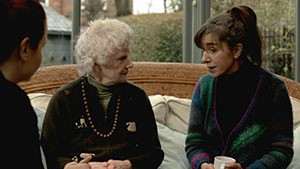


Watch the film clip of Caroline's story below and consider the questions at the bottom of the page.
 Caroline is a carer for her mother. She is married with two children and works part time. Caroline's mother Ellen has been struggling at home, and Caroline is worried about what the future will bring. Over the past fortnight Ellen has appeared reluctant to visit her usual day care centre despite enjoying it previously. More recently, Ellen has been especially distressed about going which has impacted on Caroline's ability to go to work. Caroline has submitted a complaint to the Care Inspectorate about the day care centre. The nature of the complaint is fairly unclear, but does cite a concern about "needs not being met".
Caroline is a carer for her mother. She is married with two children and works part time. Caroline's mother Ellen has been struggling at home, and Caroline is worried about what the future will bring. Over the past fortnight Ellen has appeared reluctant to visit her usual day care centre despite enjoying it previously. More recently, Ellen has been especially distressed about going which has impacted on Caroline's ability to go to work. Caroline has submitted a complaint to the Care Inspectorate about the day care centre. The nature of the complaint is fairly unclear, but does cite a concern about "needs not being met". Shirley graduated as a social worker two years ago and is working with adults in the community. Shirley is interested and committed to working with people with dementia, their families and carers and recognises that she needs to develop her knowledge and skills in this area of practice. Shirley visits Caroline as she has become aware that Ellen has not been visiting the day care centre as often and wants to know how this is affecting Caroline and Ellen's daily life. Shirley does not know that a complaint has been submitted about the day care centre.
Shirley graduated as a social worker two years ago and is working with adults in the community. Shirley is interested and committed to working with people with dementia, their families and carers and recognises that she needs to develop her knowledge and skills in this area of practice. Shirley visits Caroline as she has become aware that Ellen has not been visiting the day care centre as often and wants to know how this is affecting Caroline and Ellen's daily life. Shirley does not know that a complaint has been submitted about the day care centre. You have printed a page containing audio/video content. We can't print that, so we've provided a transcript for you instead.
Shirley - Oh thanks Caroline. As I was saying to you yesterday, I find it really helps me to get a better all-round picture if I can spend some time on my own with the carer. I also wanted to speak with you because I wondered how you were coping being a carer and living your own busy life.
Caroline - It has been very hard to see her going downhill, and to hear that my mum has been upset and difficult at the day centre. That's not like my mum. And I wonder what the future holds.
Shirley - You are going through a very difficult time right now and your responses are absolutely natural. Now it's my job to support you to be the best carer for your mum that you can be, and you are being. It's also important that you take some time for yourself.
Caroline - That doesn't seem to be possible. I can't abandon her when she needs me so much.
Shirley - Caroline, can I ask; what information have you been given about your mum's dementia and how it might progress from here?
Caroline - None really, the Doctor told me she had dementia. He said that it wasn't curable and that I needed to think about power of attorney.
Shirley - Well power of attorney can be very helpful. It allows your mum to choose who she wants to make decisions on her behalf when she cannot make her own decisions anymore. I noticed when we were chatting yesterday that she often turns her head round to you to look for reassurance. Have you already arranged a power of attorney with your mum?
Caroline - Yes, we did that last year.
Shirley - Oh that's good. I have brought a leaflet for you Caroline that I thought you might find helpful. It's based on the Standards of Care for People with Dementia and their Carers, and what they can expect. If you look at this section here, what it does is that it outlines that carers like yourself are entitled to information and support, and that you are allowed to take time off from looking after your mum.
Caroline - I didn't know that, thank you.
Shirley - I'll just leave this here for you and you can have a look at it in your own time. Now, if I was to ask you; what's important to you in relation to your mum?
Caroline - Just the simple things really, that she is healthy and well fed. That she is comfortable. That she has company.
Shirley - You are trying to meet all of those needs yourself.
Caroline - I suppose so. That's why the day centre has been so important. It gives me a break so that I can go to work.
Shirley - I can see that. What about if I asked you; what's important to you in your own life?
Caroline - No one has asked me that before. I think really it's just the people I care about. My mum. My kids. My husband. Work too, that's important to me.
Shirley - I noticed that your mum was top of your list there. Is that how it's been for you recently?
Caroline - Yes.
Shirley - How does your husband feel about that?
Caroline - He feels like he is less important. But he also understands. I know he wonders when it will all end. He says it has taken too much out of me.
Shirley - Is he right?
Caroline - Probably, but what choice do I have?